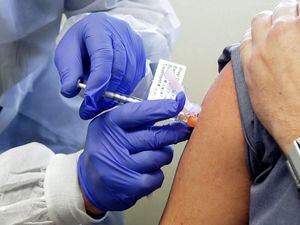Safest option of waiting for vaccine 'may not be possible'
WHILE the best time to remove all travel restrictions would be once a Covid-19 vaccine is in place the Civil Contingencies Authority says this might not be possible as it is unclear when that will be.

The advice is set out in version six of the exit from lockdown framework issued by the Civil Contingencies Authority this week, along with a warning of the likelihood of new cases being imported as travel measures are eased.
In the document, which is set to go before the States, the CCA said: ‘The need for continued focus across the States of Guernsey on travel restrictions remains; recognising that they remain of vital importance in managing our response to the risk of Covid-19 as we exit from lockdown.
‘The Civil Contingencies Authority continues to review travel restrictions as we progress through Phase 5 of the exit from lockdown. Progression toward Phase 6 might be when a vaccine or effective treatment becomes available. However, it is acknowledged that alternative strategies also need to be explored to allow for progression.’
The document said consideration was being given to an evaluation of the risk of infection in a particular jurisdiction, similar to the approach used pre-lockdown.
‘This will be augmented with a programme of testing after entry into the Bailiwick, with modifications in self-isolation.’
A tiered system of A, B and C countries is being introduced with varying quarantine requirements from Monday 17 August.
‘For example, a traveller from a Group B country, which currently includes England and Jersey, can self-isolate for 14 days or elect to self-isolate for seven days and then take a test. If the test result is negative they can go out but with some rules in place in a period known as “passive follow up”.’
The exit from lockdown document also said: ‘Preparation is also key with Public Health Services planning for a variety of scenarios. These include the re-emergence of a case, a cluster of cases, a second wave and planning for the winter season. A second wave of infection could put pressure on our healthcare capacity.
‘For this reason, the expanded hospital bed provision, although currently reconverted to business as usual, can be rapidly reconverted to allow for a resurgence of Covid-19 cases.
‘However, the prevention and/or control of imported cases of infection, with the risk of onward transmission to Bailiwick residents, is a key component in mitigating against the risks associated with a surge in healthcare requirements.’
On possible importation of cases as travel restrictions were changed, it said: ‘Despite our achievements, the likely consequence of the further relaxing current measures as we progress toward Phase 6 is that we will see new imported cases in the Bailiwick.
‘Appropriate steps need to be in place to prevent, as far is possible, the onward transmission of infection from these imported cases of Covid-19.
‘Looking at other jurisdictions can provide us with useful information, but any local framework must take into account the Bailiwick-specific needs and demographics.’





